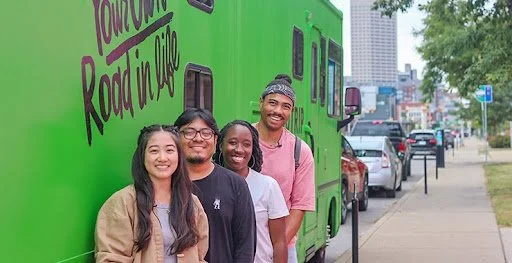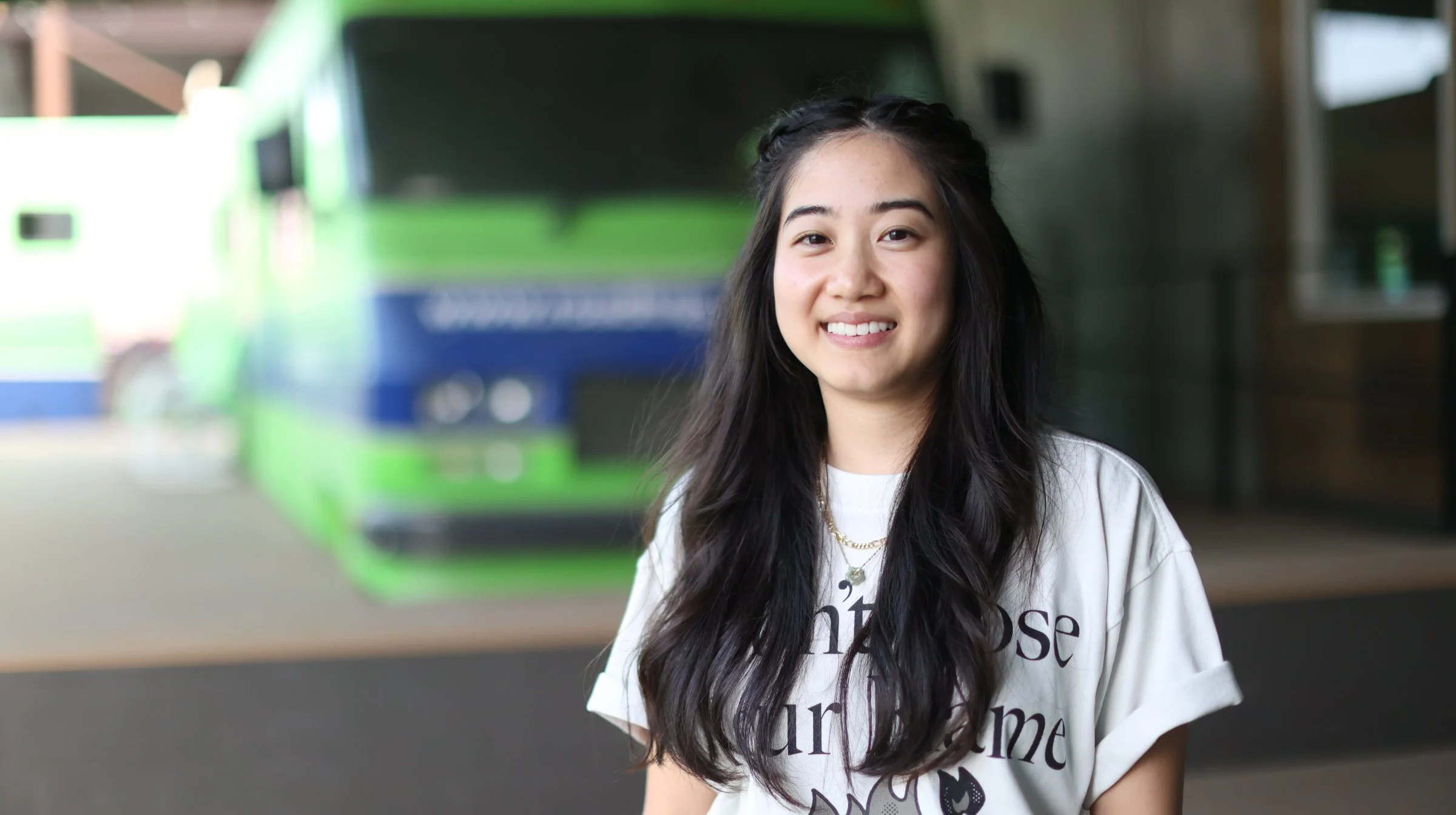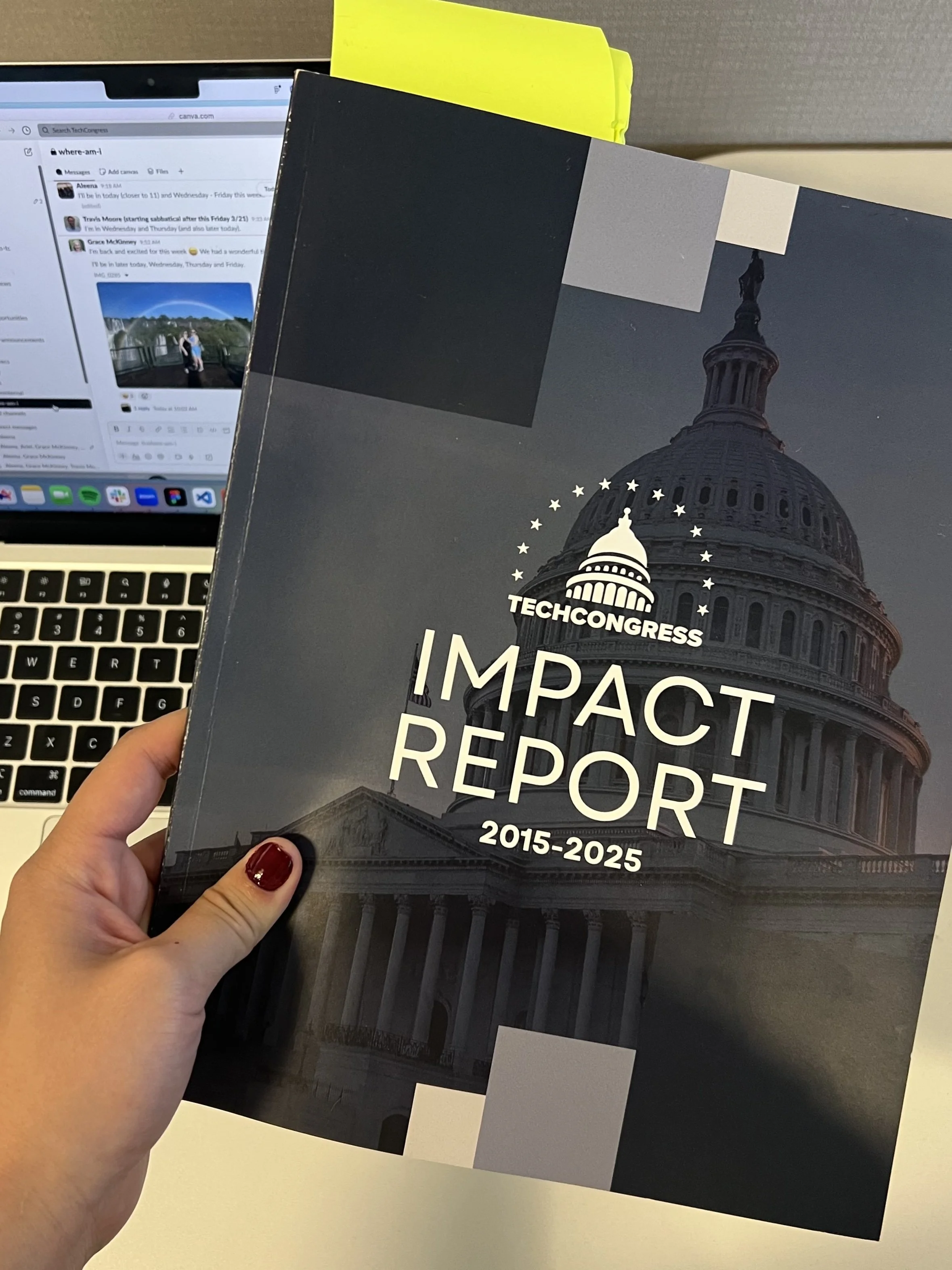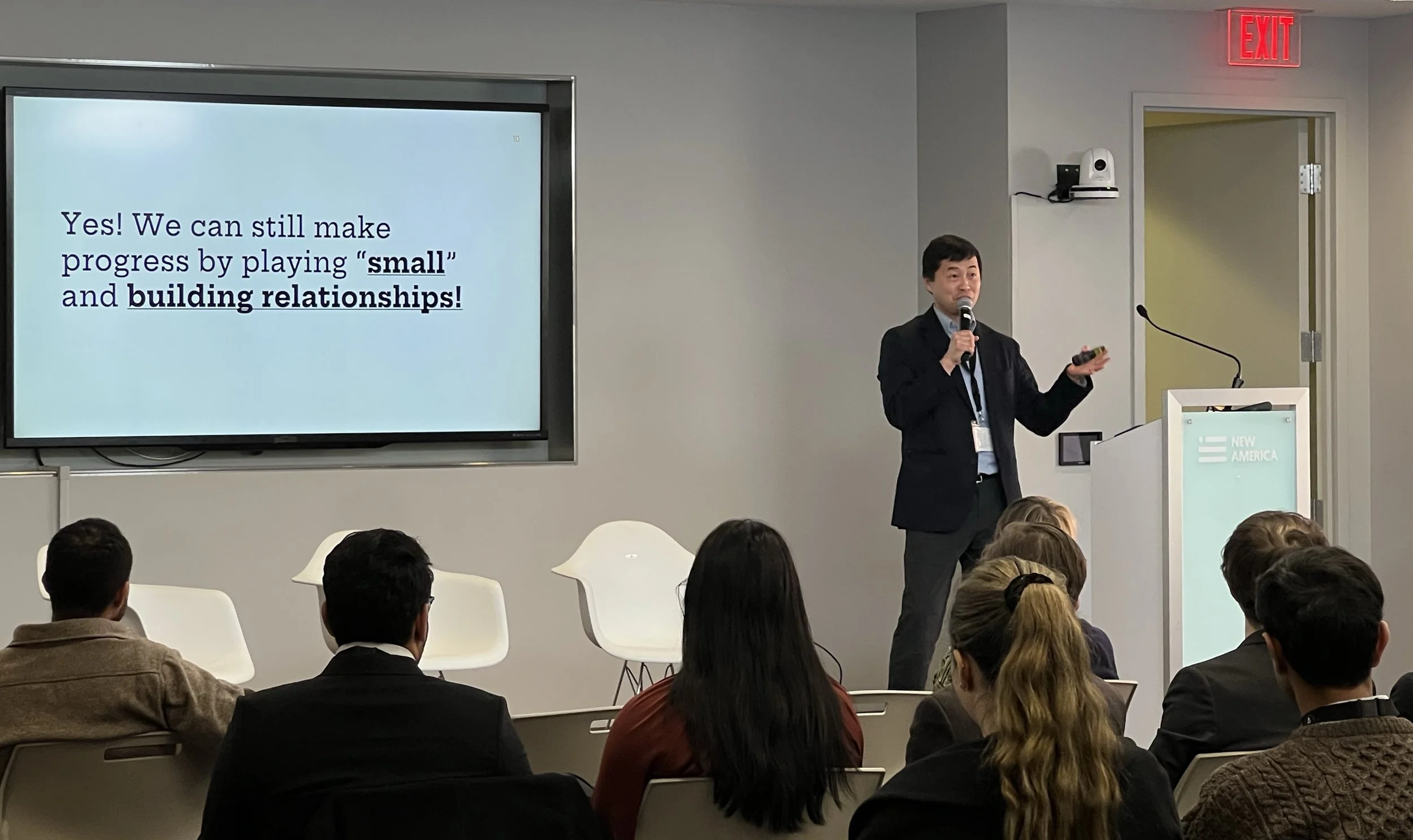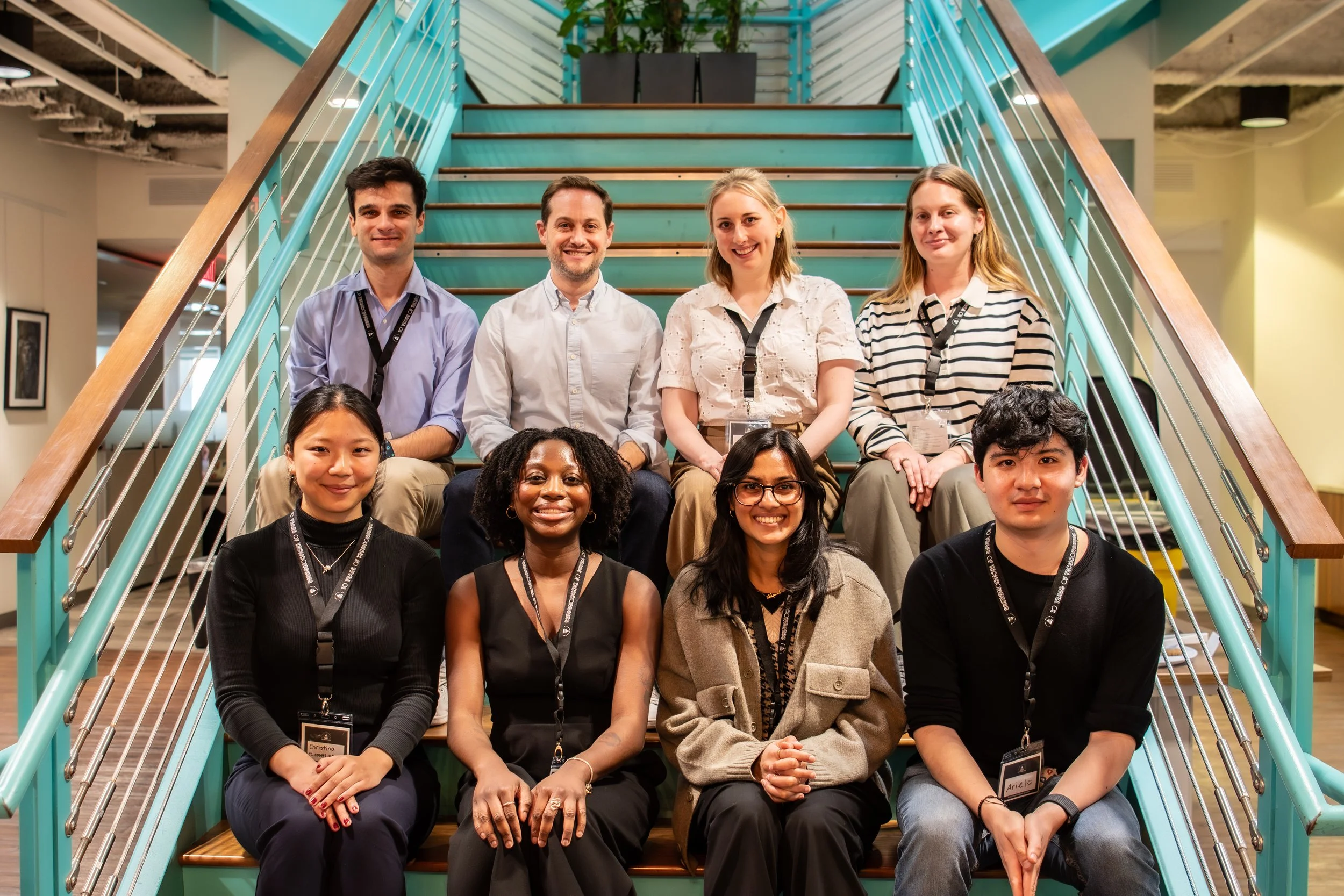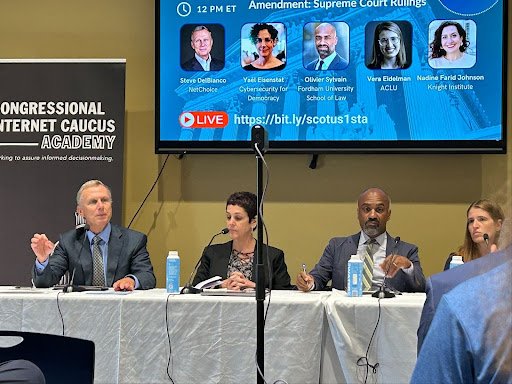“I wasn’t sure if I would like policy or what it would look like, but I wanted to see if I could use my technology skills for something more meaningful.”
This thought led Julie Lin, a 2022 TechCongress Congressional Innovation Fellow and former hardware engineer at Microsoft, to a collaboration with Roadtrip Nation that would take her and two others, Anthoni and Demaceo, on a road trip from Maine to Kentucky spanning 21 days. The result is a documentary, Tech for Us, that highlights the manifold paths within public interest technology.
In this 20-minute interview with TechCongress, Julie reflects on her journey from the private sector to public service, breaks down preconceptions about working in tech policy, and shares insights about her experience filming Tech for Us. We also discuss the process of soul-searching that often comes with career transitions, and what it means to be a public interest technologist.
Read on to learn more about how technologists across the nation leverage their skills to serve their communities and make a lasting difference.
This interview has been edited for clarity.
Thanks again for doing this, Julie. Let’s start with an overview of your career. What led you to TechCongress and what have you been up to ever since your fellowship?
Julie: I feel like I’ve had a very untraditional career path, but I think very common for TechCongress fellows. I started off my career at Microsoft working as a hardware engineer where I was building next generation devices, like laptops, phones, tablets, and I even worked on their AR/VR device like HoloLens. So, I feel like I was working on all these cool devices and because we don’t manufacture in America, I did a lot of traveling to Asia, working with suppliers and manufacturers. It was a very hands-on engineer experience, and I think during the pandemic when the world was crumbling, it was an inflection point to me of “What am I doing with my life? What impact is my career having?” I can work on the next device, but it only gets so much better. Is there something more to this? So I started looking for opportunities to use my technology experience and maybe thinking about what it could look like. So, I’m honestly not sure how I found TechCongress. Twitter, maybe? But it was this interesting nexus because I didn’t know what policy meant. I knew a little bit about government, just at the high school level. I did it as an experiment. I wasn’t sure if I would like policy or what it would look like but I wanted to see if I could use my technology skills and experience for something more meaningful and impactful. So that’s how I got to TechCongress, and ever since then, I’ve been at this nexus of technology policy and strategy. A lot of the skills that I developed through TechCongress and being on the Hill, I’ve taken that and worked with nonprofits and foundations and people in the tech policy space to help them get smarter and more strategic about how to use technology for the public good. So that’s what I’ve been up to.
You describe the trajectory that a lot of our fellows have been through—coming from technical backgrounds, really hands-on engineering experience or data science and then finding themselves in a field that is both entirely relevant to and very different from what they’ve done before. Were there any expectations that you had to unlearn or reframe when you transitioned from Microsoft to TechCongress?
Julie: I think it’s not a skill set, but I think coming from big tech, you just have a lot more resources, whether it’s people, money, and time. I think that’s a luxury that we did not have in Congress. In tech there are very established processes, but on the hill there are no 30-, 60-, 90-day plans of ramping up. You just get thrown in. Maybe you get a checklist of something but you just are thrown into it. There’s just not enough time to build these systems and processes and that was a shocking thing for me, especially because I feel like big companies always have systematic approaches to everything. There’s a way to do everything on some document somewhere, and I think on the Hill it was like a word-of-mouth thing. Someone trains you up, but there’s no paper trail. You can build one yourself, but a lot of the information is definitely word-of-mouth and it gets lost sometimes because it’s not documented as well, but there’s just so many things going on, right? It’s hard not to keep track of everything.
L to R: Anthoni, Julie and Demaceo interviewing a subject on a park bench. Photo credit: Roadtrip Nation
Tell us all about your road trip and collaboration with Roadtrip Nation. How was it?
Julie: For those who don’t know, it was essentially a month-long road trip where me and two other people who are in the public interest tech space went on a road trip from Maine to Kentucky. So we lived in an RV and we went down the East Coast through all these different states interviewing all sorts of cool people in public interest tech; so, academics, artists, small business owners, government folks, journalists… a whole spectrum of public interest tech. I think what drew me into it was I had just finished the TechCongress fellowship, and I was starting to get a taste of what this ecosystem looked like, but it was through a policy lens. I saw this opportunity and I thought it would be really interesting to expand what that looks like beyond policy. I think policy is important and is a very interesting nexus of tech and public interest technology, but I wanted to see what else was out there. I was like, why not live in an RV? That seems fun and cool. I honestly didn’t think too much of it. I get to travel, I get to talk to people and learn more about this field, so let’s do it. So that’s kind of how it came to be.
How would you say that diversity of experience or background prepares you for a career in tech policy? Could you tell us more about the people you’ve encountered during your road trip and describe any conversations that stood out to you?
Julie: I feel like everyone that I talked to on the road trip had such wild backgrounds. What they’re doing now is not what they’ve envisioned they would be doing earlier in their careers. It was kind of piecemealing it together. A lot of people were mentioning they were just following various interests that drew them and it kind of led them down this path. And I kind of feel like that’s how I am with my career. I’m just following things that are interesting. But in terms of diversity of experience, I have this tech background, I traveled a lot to Asia. There’s that whole element, but I also used to volunteer for an education nonprofit where we provided virtual tutoring to underserved communities and also was a founding board member for my alma mater’s alumni community. So, I feel like these random things were helpful. I don’t even know how to explain how they’re helpful, but these little pieces affect everything else. Some of the things I worked on in Congress had to do with the intersection of education and tech and how to train up the workforce, and thinking about that ecosystem and having volunteered in the education nonprofit, it gave me a glimpse into what that experience was like. I feel like everything is very relevant. Everything shapes you to be who you are. So I think seeing the diversity of people including the two other roadtrippers that I was with… one of them had a background in marine biology and then became a software engineer. So his view on technology is fascinating, because he thinks about it in terms of climate tech, biotech, very different things. And then the other person came in with a background in psychology and has no technical background. But he also should be in the conversation because he’s like, “Okay, when we think about technology and the psychology of it and maybe the addiction of social media, we do need the social science aspect of it too.” So I feel like all of us work together on different aspects of technology, and I think it’s really helpful and useful. And it was nice to see the way different people are doing it.
Was there a personal or professional character development moment for you at any point? Was there a Eureka moment, an insight that you gained that really stood out to you?
Julie: I think one of the biggest “Aha” moments that I had was some time in the middle of the road trip. Even though it was a very cool, novel experience, just like anything else, you got into the rhythm of it, right? A few weeks in, I woke up on the RV, and I was taking a step back and thinking about the whole experience, and it was just so cool that it intersected all the things that I was interested in. Like technology, thinking about how it could be used for the public good, talking to policy people, but also this travel element and being able to just talk to anybody and to hear their stories and get their career advice. I feel like that intersection was crazy. To be able to have an experience that encompassed all of that was very wild to me, because I feel like a lot of my interest areas seem really random but for it to come together in a very cohesive thing, for this documentary to come out, I think that changed my brain waves. There’s so much out there that you don’t even know exists. The intersection of all these things.
You mentioned being at a crossroads in the documentary. Could you share a little about which paths you were considering and the type of environment that you now view as most aligned with your ambitions?
Julie: At that time I was thinking about going back into tech and doing more technical work again because I kind of missed it. There’s nothing like building a product and being able to see the thing that you’re building, whether it’s physical or if it’s an app or website or whatever. There’s nothing like being able to do it from start to finish that you don’t necessarily see in policy because policy is such a long, drawn-out process. One of the things that I was reflecting on was also that policy doesn’t have a lot of metrics built in. Engineering is very black and white. There were quantitative elements to it but I think policy, that’s not something that people build into policy development. So that was really irking me because I think being an engineer, I’m used to those metrics and you’re like “How do I know if things are moving” and “How do I know if I’m having impact?” if you don’t have the numbers to prove it. So I think that was a big thing that I was thinking through, “Should I go back into tech purely for that? Or should I stay in this intersection?" Since then I’ve actually been able to do both. I’m still in the policy space, but I’m also working on building a policy product, like a tool. At that crossroads, it was important to know or to think about what I liked or didn’t like and what I thought was missing in this work that I was doing and exploring. But I feel like I’m still trying to figure it out. I feel like I just keep gravitating towards things that are interesting to me.
L to R: Julie, Anthoni, an interview subject, and Demaceo pictured outside their RV. Photo credit: Roadtrip Nation
And it’s starting to materialize, right? I mean, tangent, but we’d love to hear more about this policy tool.
Julie: It’s actually funny because I’m working on it with someone else from TechCongress. So I feel like a lot of us who have a technical background and go into Congress, we’re shocked by just how it works. There’s nothing like learning about how it is from the inside. And even internally in Congress when you talk about a certain bill or certain policy area, it’s kind of unclear why certain bills move. All of a sudden something can just have momentum, and sometimes you know what’s going on but sometimes you have no idea why, even if you’re in it. There are all these influences, whether it’s a corporation, or the history of a Member that affects policy, but there’s not a lot of transparency to it. Or you have to deep dive a 100 different Google articles and then maybe there’s this one line that links this one thing that you thought was random to a Member and you’re like, “Oh, that’s why there’s movement in this” or “That’s why they wrote a bill in this specific way.” So, the tool that we’re trying to build is like a policy transparency tool that tries to map all of these influences that affect policy. On the other side of it is policy advocacy. There are a lot of people who come in with pressing issues, like education or technology or broadband. A lot of people came into our offices asking for help. That’s another component of it, being able to link all of the things together to make advocacy and the space more transparent and effective. So that’s what we’re hoping this policy tool will help with: transparency and also making advocacy more effective.
Bringing it back on topic, how can institutions better support people making the leap to public interest tech? What do you think needs to change? What do we need more or less of?
Julie: I feel like a lot of industries are very siloed, right? Tech is very siloed, policy in general is very siloed, government, art, all these things are very siloed. I think we need more people in the middle of all of them that can talk to each other and understand the value of the other thing. For example, in tech policy, pure policy people need to understand some of the technical things and understand the value of that but on the other side of technology and technologists and engineers, they also need to understand the value of policy and how it’s like a collaborative thing and how they both need to exist in order for us to build something more well-rounded and have safeguards and all that stuff. But I feel like there’s not enough people in the intersections to be able to translate them and to tell both sides that they’re both important, but they also need to be able to understand why they’re important. And I think it’s hard for engineers and technologists to translate how their skill set is important in the policy space and vice versa. I think we need more people talking about that and the gaps or bridging the siloes. I feel like even talking to TechCongress alumni and people trying to figure out what to do after, there’s like this small bubble of TechCongress fellows who understand each other because we’re like “Oh, we both went from tech policy. We understand both.” But there’s still not enough people who understand the value of both individually and can see the value of them coming together. So, I don’t know how we can fix that. But I think these intersections, these nodes, I think we need more people in them.
In closing, what advice would you give to someone who might be going through a similar situation as you? So maybe an early career technologist who wants to make a transition into public interest tech but doesn’t know where to start.
Julie: The advice I’d probably give is to just go and collect experiences. I always say this, but “you don’t know what you don’t know.” And that’s like finding out about TechCongress, right? I think you just have to do random things that pique your interest and you never know where it’ll take you. But specifically with public interest tech, every organization has some arm of tech for good. So I remember exploring that even internally when I was at Microsoft and what that looked like and looking at all these initiatives they had. So within the ecosystem that you’re in, go find those areas that are interesting to you and learn more. Go talk to people and see if you can work on a project or do something. I think people are always willing to talk about their experiences, so reach out to anyone who seems interesting and you never know where it’ll take you.
It’s been such a pleasure having you on for this, hopefully, first of many TechCongress alumni interviews. We look forward to hearing all about what you do next.
Julie: Yeah, thanks for having me. This was so fun!
Julie Lin
Julie Lin is an engineer turned policy entrepreneur passionate about the intersection of technology and social impact. She currently advises on technology policy and strategy as an independent consultant, drawing on her background in engineering and product development to translate complex technical concepts into initiatives that empower and protect everyday people.
Julie Lin holds a Bachelor of Science in Mechanical Engineering from the University of Michigan.
Watch Tech for Us here.
LinkedIn: Julie Lin
TechCongress is a technology policy nonprofit that helps Congress meet the demand for tech expertise through our Congressional Innovation Fellowships. We help provide Congress with the talent it needs to navigate the fast-moving technology landscape. Julie Lin is among 123 TechCongress alumni who continue to sustain impact in civic tech, so that digital services reach those who need them most.
Watch Tech for Us here. For more on TechCongress, check out our website and follow us on LinkedIn and X.
This piece was transcribed by Emmy Ly (TechCongress Communications Intern) and edited by Timour Razek (TechCongress Communications Manager)





